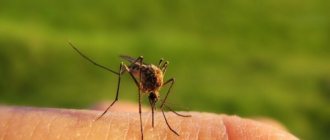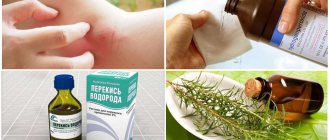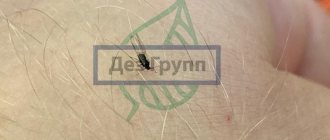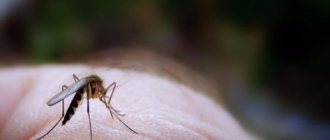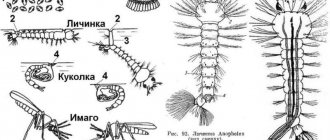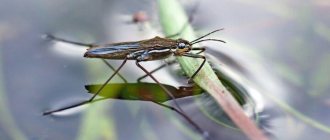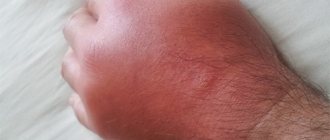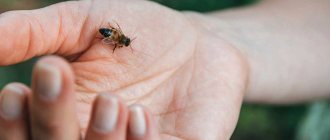A mosquito bite is a completely normal occurrence for most people. With the onset of warmth, blood-sucking insects attack in the forest, near the river, in a summer cottage, even at home. Most often, the reaction to a bite is limited to the appearance of a small, itchy spot, which soon goes away.
But in order to avoid unpleasant consequences, you need to know how an allergy to mosquito bites manifests itself, as well as what else can cause a rash similar to mosquito bites.
The body's reaction to a bite
As you know, only female mosquitoes bite, which through their blood receive proteins and nutrients necessary for the formation and laying of eggs. Using a sharp file located on the lower jaw, the insect cuts through the skin, injects saliva, which has anesthetic properties, into the wound, immerses the proboscis and sucks out the amount of blood necessary for saturation.
A mosquito bite is similar in appearance to the bites of other insects; it looks like a red swollen spot, the diameter of which usually does not exceed 1.5 cm. In the center there is a dense tubercle, on which, upon closer inspection, you can see a point - the place of penetration of the proboscis.
Bite mark
In addition to the appearance of a stain, most people experience mosquito bites with the following symptoms:
- redness of the affected skin area;
- slight swelling;
- the appearance of itching.
This is a normal reaction of the body to a violation of the integrity of the skin and the introduction of a foreign substance, which manifests itself very quickly. Therefore, swelling and redness become noticeable almost immediately after the bite, and sometimes even during it.
Itching from mosquito bites
In addition to swelling and redness after a mosquito bite, most people begin to experience unpleasant itching and burning in the affected area of the skin. Sometimes the spots not only itch, but are also slightly painful when pressed.
The appearance of itching is due to the fact that at the time of the bite, insect saliva, which has a complex composition and is a strong allergen, enters the wound. The immune system immediately reacts to the foreign element and tries to neutralize it by releasing immunoglobulins. It is the antibodies sent to the site of penetration of the allergen, and their interaction with it, that cause the mosquito bite mark to begin to itch.
The intensity of itching depends on the state of health of a person, his immunity and the individual characteristics of the body. If you scratch the affected area, the lump that appears after the insect bite will increase, and the itching will intensify, as the allergen will begin to spread further through the soft tissues. In addition, an infection can get into the wound, which will provoke inflammation, another portion of antibodies from the immune system, and therefore increased discomfort, including itching.
Causes of swelling and redness
Almost everyone experiences redness and swelling after a mosquito bite. Typically, blood-sucking insects try to choose an area to bite where the skin is thinnest and most delicate, and the blood vessels are located very close. This makes it easier for the bloodsucker to gain access to fresh blood. The appearance of a red, swollen spot after a mosquito bite is caused by several reasons:
- Firstly, the saliva that enters the wound at the time of the bite has anticoagulant properties, that is, it prevents blood clotting.
- Secondly, by plunging its proboscis into soft tissue, the mosquito damages the walls of the capillaries.
- Thirdly, immunocompetent cells sent to fight the foreign protein, interacting with it, are destroyed, further damaging small vessels.
All this causes the formation of a hematoma, as well as the accumulation of fluid at the site of the mosquito bite, which outwardly looks like swelling and redness. In addition, the appearance of redness is due to the fact that after an insect attack, a wound, albeit tiny, appears on the skin.
In children
Bite bumps are usually more noticeable in children and people with sensitive skin.
If a mosquito bites you in the eye
The skin of the eyelids is delicate, thin, and stretches freely. Any negative mechanical effect on the eyelid can cause swelling. Therefore, the situation when a person is bitten in the eye by a mosquito, and after that it swells, is completely normal. After an insect bite, the outflow of lymph is disrupted; fluid gradually accumulates in the upper eyelid, causing it to appear as if it is inflated. Damage to the walls of small capillaries causes the eyelid to acquire a purple-pink color.
So, after an insect bite, swelling appears on the eye, and in addition, sensitive skin begins to itch very much.
Attention! Scratching the eyelid and rubbing the eye is strictly not recommended. Otherwise, the itching and swelling may intensify, a secondary infection will join the inflammation, and the eye will begin to fester. As a result, instead of a mosquito bite, purulent conjunctivitis will have to be treated.
The doctor explained why you should not scratch mosquito bites
Mosquito bites can lead to the appearance of parasitic helminths in the human body, so they should not be scratched.
Lyudmila Ganushkina, leading researcher at the research department of the Martsinovsky Institute of Medical Parasitology, Tropical and Vector-Borne Diseases at Sechenov University, reported this to the Moscow City News Agency.
“Their bites can cause allergies. In addition, mosquitoes both in Moscow and in most of Russia are infected with heartworms and, when bitten, can transmit them to humans. The infestation rate of mosquitoes ranges from 2 to 5%,” the specialist noted.
If an infected mosquito bites a person, a helminth begins to grow and become parasitic in the person’s body. After some time, it may approach the eyelid, or appear under the skin.
“In any case, the larva is moving, and if you feel some strange sensations in the body, if a papule has formed (nodule on the skin - editor’s note) - then you need to consult a doctor,” Ganushkina said.
To protect yourself from mosquitoes, you need to wear clothes that cover your body as much as possible, and hang a canopy over your bed.
“If you go to the forest or to the dacha, then you need to dress in such a way as to protect yourself: wear a light long-sleeved shirt, use a hat and a net,” Ganushkina explained.
She emphasized that at the moment there is not a single effective folk remedy for mosquito control. Wormwood, garlic and clove tinctures help for a while, but do not protect 100%.
In people prone to allergic reactions, mosquito bites can cause hives, and scratching the skin at the site of the bite can lead to infectious diseases.
“Mosquito saliva is not a source of infection, but if the skin is damaged during scratching, pathogenic bacteria can enter the wound. This leads to the development of bacterial skin diseases, which can be superficial or deep and can cause serious complications. In addition, after strong scratching, traces can remain on the skin for a long time, including scars,” said allergist-immunologist Galina Tereshchenko.
If swelling, difficulty breathing, itchy blisters and fever occur, you should consult a doctor and do not self-medicate. Do not scratch, rub or damage the bite site. Using vinegar and soda solutions to relieve itching can cause irritation.
“If it is obvious that there is an infection at the site of the bite, that is, an abscess has formed (the site of the bite is hot to the touch, it hurts), in no case should you try to open it yourself.
This can be extremely dangerous, especially if the infection occurs in the head area. In this case, you should definitely consult a doctor,” added Tereshchenko. All the most interesting things are in our Yandex.Zen channel
Symptoms of an allergy to a mosquito bite
The bite of a blood-sucking insect provokes the development of an allergic reaction. In a normal situation, everything is limited to slight redness, swelling and itching. But it also happens that the body reacts strongly to the presence of an allergen. In this case, in addition to the fact that the skin is very swollen and red after a mosquito bite, the following symptoms may appear:
- unbearable itching;
- hives;
- the appearance of blisters at the site of the bite;
- increased skin temperature in the affected area;
- runny nose, sneezing;
- lacrimation;
- chills;
- weakness.
If, soon after an insect attack, a person develops any of the listed signs, it is necessary to take an antihistamine and carefully monitor the condition of the bitten person. If his condition does not improve and his symptoms do not subside, you should consult a doctor.
Sometimes more dangerous symptoms are observed:
- difficulty breathing, shortness of breath;
- severe weakness;
- dizziness;
- low pressure;
- nausea, sometimes vomiting;
- fainting;
- convulsions;
- Quincke's edema.
At a doctor's appointment
In this case, you should immediately seek medical help to avoid negative consequences.
Who do they prefer to bite more often?
Why don't mosquitoes bite everyone? Mosquitoes bite almost everyone. However, you probably noticed that the mosquitoes that flew into the room bit the child more strongly, while others were hardly touched. There is an explanation for this. Children's skin is delicate and thin, so it is easier to bite through it, the capillaries are located closer to the surface, and the metabolism is faster than that of an adult. Therefore, the child is an easy prey.
Female mosquitoes are attracted to the smell of lactic acid from human sweat and exhaled carbon dioxide. They like the smell of steroids, cholesterol and nonanal. This occurs in obese people and patients with cardiovascular diseases. Another preference is for those who have high testosterone or estrogen levels. Strong men and pregnant women are at risk for bites.
You may notice that a mosquito bites a child most readily; this is not surprising: children’s skin is thinner than that of an adult, and the capillaries are closer to the surface
Bloodsuckers react to warm-blooded creatures, so they choose people who are hotter to the touch. This may be why people with malaria are bitten more often by mosquitoes.
Insects do not like the smell coming from people taking cholesterol-lowering medications. In some cases, mosquitoes are attracted to the scent of face and hand cream, hair balm or aftershave.
Rash like mosquito bites
Rashes that look like mosquito bites can actually be caused by completely different reasons. Among them:
- Allergic urticaria. The cause of the pathology is contact with an allergen, which can be a certain fabric, cosmetic product, household chemicals (for example, washing powder or dishwashing detergent), dust, or pet hair. In this case, blisters appear on the body, as if from a mosquito bite.
- Prickly heat. A small rash on the skin appears due to a violation of the thermal regime, non-compliance with hygiene rules, the use of low-quality cosmetics, and endocrine pathologies. It is most often diagnosed in infants, but can also occur in adults.
- Nutritional atopy. It occurs suddenly as a consequence of an allergic reaction to food.
- Infectious diseases (rubella, measles, chicken pox, scarlet fever). Most often, in this case, the appearance of spots and bumps on the body as if from mosquito bites is accompanied by other characteristic symptoms, for example, fever, weakness, and sore throat.
- Rashes on the body may be the result of an attack not by mosquitoes, but by other insects. Careful examination of bite marks will help determine the type of bite. You also need to pay attention to the location of the rash and accompanying symptoms.
Much less often, rashes that resemble mosquito bites can be caused by vascular pathologies or blood diseases. Such a rash is easy to distinguish from mosquito bites, since at the same time bluish spots appear on the skin, similar to bruises.
Mosquitoes are carriers of dangerous diseases
Dangerous infections transmitted after a mosquito bite are a situation typical for warm countries. However, cases of transmission of dangerous diseases are increasingly occurring in our country. You can receive “as a gift” from a bloodsucker not only an itch, but also:
To exclude cases of the disease, it is recommended to get vaccinated before traveling to warm or Asian countries.
After a mosquito bite, the bite sites become very swollen and do not go away for a very long time, they ooze and itch, although others don’t have this, why?
Mosquitoes do not have poison; when they bite, they inject an anticoagulant under the skin - a substance that prevents blood clotting. And apparently you are allergic to this coagulant. To relieve swelling, try using resorcinol alcohol. You can use folk remedies, apply onions for about 30 minutes, and you can also use soda, which removes swelling, or brilliant green, which prevents infection of the bite site.
When a mosquito bites, it injects a little poison into the human body (it is practically harmless) for disinfection, but it is this poison that causes such a reaction in the human skin. Most likely you are allergic to the components of this poison. Consult your dermatologist. And it helps me to wipe the bite areas with vinegar.
Reactions to mosquito bites vary depending on tolerance. Some people have a mild reaction, while others scratch them until they bleed. The drug Fenistil helps me, which is designed just for such cases. Mosquito bites and other insects. Or let’s say you were burned by nettles. Well relieves allergic skin reaction to blood-sucking bites.
This is your body and skin.
Try not to scratch the bites. Otherwise, you can spread some kind of infection.
Wipe the bite area with alcohol or hydrogen peroxide and lubricate the star with balm.
Now pharmacies sell other remedies to relieve itching, but I don’t know what they do.
The star has stood the test of time.
I have the same problem. The bites can itch even for several days. This is a feature of the body. It is better to immediately wipe the bite with an alcohol wipe or at least just a damp one. The sooner you do this, the better this method will help. In general, antihistamine lotions and ointments will help a lot.
Just come to terms with the fact that your skin and body as a whole reacts this way to a mosquito bite. I advise you to have some kind of cream when you go outdoors. for example, “Savior”, helps very well with mosquito bites, relieves itching and swelling.
Differences between a mosquito bite and a bug bite
A slight inflammation of the skin is noticeable after the bite of almost any insect. Most often, mosquito bites can be mistaken for marks left by bed bugs. At first glance, they are almost identical, but upon closer inspection, it is easy to understand how a mosquito bite differs from a bug bite:
- appearance (the outlines of a mosquito bite are blurred, in contrast to the clear outline of a bedbug bite);
- size (spots that appear after bedbug bites are smaller);
- location (mosquito bites are randomly distributed throughout the body, bed bugs are grouped in chains of several pieces);
- time of appearance (bugs bite people only at night, while mosquitoes feed around the clock).
Bedbug bite
In addition, the behavior of these blood-sucking insects is different. Bedbugs live secretly, during the day they hide in secluded places where they are difficult to detect, and do not make any sounds. Mosquitoes, on the other hand, announce themselves with a nasty squeak, do not disguise themselves, but rather, on the contrary, annoyingly flicker before their eyes, trying to land on the victim and finally start eating.
How long do mosquito bites last?
How long it takes for your skin to be free of mosquito bite marks depends on several factors. The main ones are:
- age and health status of the person bitten;
- predisposition to allergies;
- number and location of bites.
In addition, it is of great importance whether the person scratched the affected areas.
Most often, the bite goes away within 1-2 days. In children, the period is usually a little longer - 3-4 days. If a severe allergic reaction or infection occurs, the wound may require treatment and healing will take 10 to 15 days.
Why does a reaction to a mosquito bite occur?
Male and female mosquitoes differ in the type of food they eat. Males are vegetarians, feeding on nectar and pollen. Blood is drunk by fertilized females, who need it to reproduce. To make sucking easier, they inject saliva containing an anticoagulant under the victim's skin. This prevents blood clotting and allows the female to suck it out of the capillaries faster.
Mosquito saliva is toxic to humans and causes inflammation in the body. The bite site itches, redness and swelling appear there. If the body’s reaction is normal, then the unpleasant symptoms quickly pass: the size of the redness does not exceed 5 mm in diameter, the swelling and itching disappear within 24 hours.
The red spot lasts no more than a week, after which the skin is completely restored. A mosquito bite does not require treatment: to reduce itching, the reddened area is wiped with hydrogen peroxide or an alcohol composition.
The reaction of the immune system to mosquito saliva is determined by the characteristics of the body. It has been noticed that in people from rural areas, bites go away much faster than in city dwellers. This is explained by the fact that rural residents have been bitten by mosquitoes since early childhood, so many have developed antibodies to the toxins contained in their saliva. Their bite marks disappear the very next day.
The body's reaction also depends on the type of parasite. When bitten by a biting mosquito, which lives in tropical and subtropical zones, a fast-growing blister appears on the skin, reaching 12 mm in diameter. It is accompanied by a strong burning sensation. When a malaria mosquito bites, a slight redness appears with a nodule in the center. Both of these species are carriers of dangerous diseases: malaria, yellow fever, dengue.


